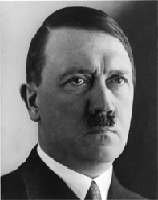
No. 1 Adolf Hitler
After the War, Hitler became rather involved with various extremist political groups. Hitler took over the German Worker's party, and renamed it the National Socialist German Workers Party (NAZI party) in 1920. This party attempted to take over power in Germany in 1923, the so-called beer hall putsch, but that was put down by the Munich police. Hitler was sentenced to about a year in prison (rather light for the crime of High Treason), and during that time he wrote the book Mein Kampf (My Struggle) which outlined his plan for taking over Germany. It succeeded, and by 1933 he was Chancellor. When the Reichstag, or Parliament, mysterious burned to the ground, he took on even more powers. Hitler began to work towards getting more power for Germany, mostly by taking over more land. He took over Austria, without serious opposition from the Western Powers, and soon after took the Sudentenland (part of Czechoslovakia) and soon afterwards, he took all of Czechoslovakia. The western powers condemned this, but chose to 'appease' Hitler, and did not stop him. Within a year, Germany and those powers were at war. On September 1, 1939, German troops stormed the Polish border, and within 48 hours the entire continent was at war. By spring of 1940 France and most of the Continent was occupied, and England looked like it might fall. However, due to actions taken during the war, which will not be mentioned here, Germany was eventually defeated by the combined efforts of the US and the USSR, and Hitler committed suicide on April 30th 1945 in his Berlin Bunker. One action taken under Hitler's direct orders that must be addressed is the Holocaust. This large scale massacre ended in the death of six million Jews and hundreds of thousands, if not millions of political prisoners, gays, gypsies, handicapped and many other 'undesirables'. This 'final solution' was carried out under Hitler's direct orders, and Europe has never really recovered from it. The first factor that dictates admission to this site is the direct impact on people's lives. Here the answer is obvious. Hitler created the biggest war that this planet has ever known. Fifty Million individuals died, and that is a direct impact on their lives. Moreover, hundreds of millions had to live with the threat of death, the ever-present fear that comes with living in a war zone, and the rationing and sacrifices that are required. Those who were Jewish had to live with being torn apart from family and lifestyle, and then brutally executed. Much of Europe was now occupied and had to live under armed 'protection'. Indeed, people's everyday lives were very much changed by Adolf Hitler. The second factor is impact on countries. Germany nearly tripled in size during the war, and all the countries around it were occupied, a significant change. Moreover, this was the last 'hurrah' for the European military machines, WWII proved that the United States would be the military power for the next-half century, and that was significant. Countries were also impacted because they had to commit huge fiscal resources to the war, and that was a major endeavor. The third reason for inclusion on the list is impact on large-scale movements, and here the answer is obvious. Hitler was the first true fascist, and all of the hard-right totalitarian movements that we have had to live with stem from that. Hitler also created the Nazi movement, and all of the white-pride and anti-Jewish movements that exist today throughout much of the US stem from that. Modern Anti-Semitism stems from Hitler, and to a limited degree globalization, which started to prevent something like Hitler from every happening again. Hitler did have an incredible impact on Europe-and the world.
|
